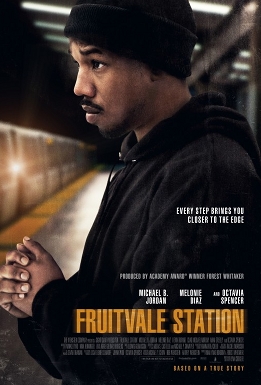Ryan Coogler's searing debut succeeds wildly as a movie. As a first feature, it's even more impressive. But Coogler seems discontent with Fruitvale Station simply being a well made movie. As presented, Fruitvale Station wants to be more of a grand, incendiary statement on race relations in America.
The word "statement" is key. I'm a big fan of movies that provoke discussion, but Fruitvale Station only wants to provoke you to action. It plays fast and loose with the facts, presenting a rosier picture of its protagonist than could ever be possible and a very strict version of tragic events that leaves no room for gray areas.
In the film, we only see the last 24 hours of the life of Bay Area resident Oscar Grant, from the early hours of New Year's Eve to his shooting death by a police officer. Most of what we're seeing is fiction, artistic license exercised by Coogler. That's perfectly fine, except that it's overused.
Michael B. Jordan plays the late Oscar, and he is magnificent, as any fan of The Wire or Friday Night Lights will tell you. As usual, he completely embodies a young man trapped by both circumstance and habit. Oscar is trying to turn his life around after a prison stint, hoping to provide a better example to his girlfriend and daughter by leaving behind his drug-dealing ways.
But Coogler continues to stack the deck, presenting Oscar as not just a wayward man trying to make good but as a saint among men. He's a loyal father, son, brother, and mostly loyal boyfriend. The version of events we're getting portrays Oscar as not just the victim of a senseless tragedy but a hero who was cut down in his prime.
The climax of the film takes place at the titular terminal, and it's one of the most harrowing scenes of the year. Coogler is no longer sketching Oscar as an angel. He brings the film down to earth, nailing the confusion and anger for all parties involved. The problem is Coogler leaves out vital details of the incident to make it look less like a horrific event caused by that confusion and anger, as well as fear and overreaction. His editing choices and factual omissions want to present it as a tragedy caused solely by institutional racism.
Fruitvale Station ends shortly after Oscar's death at a Bay Area hospital. Instead of showing the aftermath and the effect on the community, Coogler instead opts for title cards presenting the bare facts, bringing special attention to the trial of the cop who shot him and how he was only convicted of involuntary manslaughter, which carries a lesser sentence.
The great performances"”particularly by Octavia Spencer as Oscar's mother"”and writing of the film are undercut by Coogler's refusal to let the events speak for themselves. By intentionally obscuring key details about the case in order to provoke a specific response from the audience, he sells his own film short.

